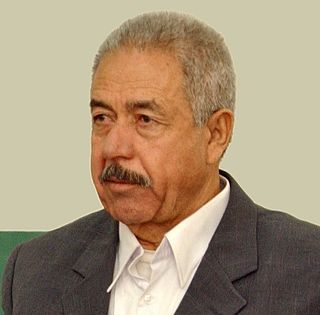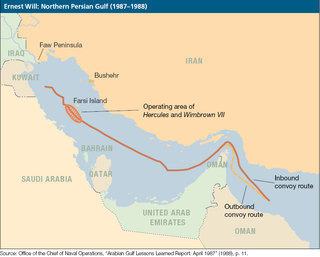The Protocol for the Prohibition of the Use in War of Asphyxiating, Poisonous or other Gases, and of Bacteriological Methods of Warfare, usually called the Geneva Protocol, is a treaty prohibiting the use of chemical and biological weapons in international armed conflicts. It was signed at Geneva on 17 June 1925 and entered into force on 8 February 1928. It was registered in League of Nations Treaty Series on 7 September 1929. The Geneva Protocol is a protocol to the Convention for the Supervision of the International Trade in Arms and Ammunition and in Implements of War signed on the same date, and followed the Hague Conventions of 1899 and 1907.

United Nations Security Council Resolution 1441 is a United Nations Security Council resolution adopted unanimously by the United Nations Security Council on 8 November 2002, offering Iraq under Saddam Hussein "a final opportunity to comply with its disarmament obligations" that had been set out in several previous resolutions. The United States used it as part of the legal justification for the subsequent US-led invasion of Iraq.

The Biological Weapons Convention (BWC), or Biological and Toxin Weapons Convention (BTWC), is a disarmament treaty that effectively bans biological and toxin weapons by prohibiting their development, production, acquisition, transfer, stockpiling and use. The treaty's full name is the Convention on the Prohibition of the Development, Production and Stockpiling of Bacteriological (Biological) and Toxin Weapons and on their Destruction.

United Nations Security Council Resolution 687 was adopted on 3 April 1991. After reaffirming resolutions 660, 661, 662, 664, 665, 666, 667, 669, 670, 674, 677, 678 and 686 (1991), the Council set the terms, in a comprehensive resolution, with which Iraq was to comply after losing the Gulf War. Resolution 687 was passed by 12 votes to one (Cuba) against, with two abstentions from Ecuador and Yemen, after a very extended meeting. Iraq accepted the provisions of the resolution on 6 April 1991.

War can heavily damage the environment, and warring countries often place operational requirements ahead of environmental concerns for the duration of the war. Some international law is designed to limit this environmental harm.

In violation of the Geneva Protocol of 1925, the Iraqi Army initiated two failed and one successful (1978–1991) offensive chemical weapons (CW) programs. President Saddam Hussein (1937–2006) pursued the most extensive chemical program during the Iran–Iraq War (1980–1988), when he waged chemical warfare against Iran. He also used chemicals in 1988 in the Al-Anfal Campaign against his civilian Kurdish population and during a popular uprising in the south in 1991.

The legality of the Iraq War is a contested topic that spans both domestic and international law. Political leaders in the US and the UK who supported the invasion of Iraq have claimed that the war was legal. However, many legal experts and other world leaders have argued that the war lacked justification and violated the United Nations charter.

United Nations Security Council resolution 479, adopted unanimously on 28 September 1980, after reminding Member States against the use of threats and force in their international relations, the Council called upon Iran and Iraq to immediately cease any further uses of force and instead settle their dispute through negotiations.

United Nations Security Council resolution 514, adopted unanimously on 12 July 1982, after recalling Resolution 479 (1980) and noting the mediation efforts by the Secretary-General, Organisation of the Islamic Conference and the Non-Aligned Movement, the council expressed its deep concern at the prolonged conflict between Iran and Iraq.

United Nations Security Council resolution 522, adopted unanimously on 4 October 1982, after recalling Resolution 479 (1980) and Resolution 514 (1982), the council called for an immediate ceasefire between Iran and Iraq, calling for the withdrawal of both sides to their internationally recognised borders.

United Nations Security Council resolution 540, adopted on 31 October 1983, noting the report of the Secretary-General and the increased cooperation from the governments of Iran and Iraq, the Council requested he continue with the mediation efforts in the region.

United Nations Security Council resolution 552, adopted on 1 June 1984, after hearing complaints from Bahrain, Kuwait, Oman, Qatar, Saudi Arabia and the United Arab Emirates regarding attacks on their ships by Iran, the Council condemned the attacks, reiterating that Member States should refrain from using threats or use of force in their international relations.

United Nations Security Council resolution 582, adopted unanimously on 24 February 1986, after noting that the council had been seized for six years and the continued conflict between Iran and Iraq, the council deplored the initial acts that started the Iran–Iraq War and continuation of the conflict.

United Nations Security Council Resolution 612 was adopted unanimously on 9 May 1988. After considering a report by the Special Mission that was dispatched by the Secretary-General to investigate the alleged chemical warfare that had been occurring in the Iran–Iraq War, the council confirmed the use of chemical weapons and issued a condemnation on the grounds that the usage of these weapons ran contrary to states' obligations under the Geneva Protocol.

United Nations Security Council resolution 616, adopted unanimously on 20 July 1988, after hearing representations from the Islamic Republic of Iran, the Council expressed its distress at the downing of Iran Air Flight 655 over the Strait of Hormuz by a missile from the United States Navy cruiser USS Vincennes during the conflict between Iran and Iraq.

United Nations Security Council resolution 619 was a resolution adopted unanimously on 9 August 1988 by the United Nations. The resolution came after recalling Resolution 598 (1987) and approving a report by the Secretary-General Javier Pérez de Cuéllar on the implementation of paragraph 2 of Resolution 598.
United Nations Security Council Resolution 1762 was adopted on 29 June 2007.
The United Nations Security Council adopted United Nations Security Council resolution 2235 (2015) on 7 August 2015, in response to use of chemical weapons in the Syrian Civil War. The resolution condemned "any use of any toxic chemical, such as chlorine, as a weapon in the Syrian Arab Republic" and expressed determination to identify and hold accountable those responsible for such acts. The resolution established a Joint Investigative Mechanism (JIM), a partnership between the United Nations (UN) and the Organisation for the Prohibition of Chemical Weapons (OPCW). The Security Council renewed the JIM's mandate in resolution 2319 (2016) on 17 November 2016, for a further period of one year.

The United Nations Security Council Resolution 2235 is on establishing a Joint Investigative Mechanism to identify individuals, entities, groups, or governments responsible for use of chemical weapons in the Syrian civil war.
The United Nations Secretary-General's Mechanism for Investigation of Alleged Use of Chemical and Biological Weapons (UNSGM), is a tool that allows the Secretary-General to investigate alleged uses of biological or chemical weapons. The UNSGM is not a standing investigative body, but instead relies on a member state-provided list of qualified experts, consultants, and analytical laboratories that may be activated on short notice to support UNSGM investigations.












